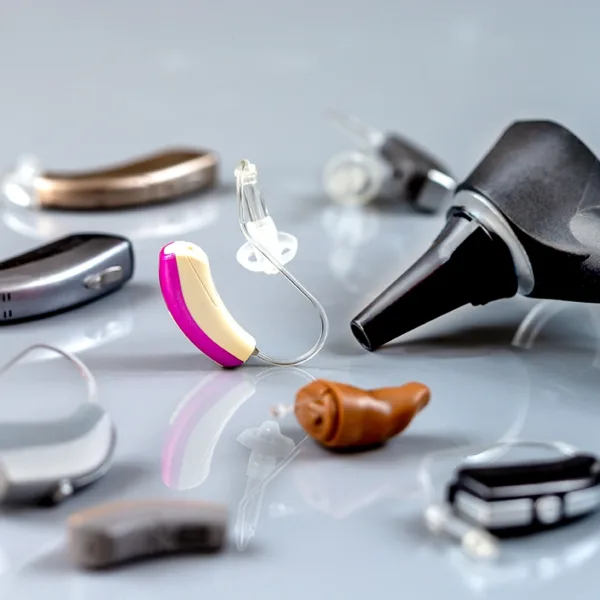
Did you know that age-related hearing loss can directly impact your cognitive health and brain function? Several large studies have shown that when hearing loss is left untreated, people have an increased risk of developing dementia later in life.1 Enter AI hearing aids—a breakthrough innovation that is reshaping hearing loss care through the power of artificial intelligence (AI).
Read on to learn more about the link between hearing loss and dementia, and how AI hearing aids benefit cognitive health and brain function.
The Link Between Hearing Loss and Dementia

Hearing loss is the largest treatable risk factor for dementia in people between the ages of 45-65.2 A study conducted by researchers at Johns Hopkins found that even mild degrees of hearing loss doubles the risk of dementia, and severe hearing loss increases the likelihood by five times.1
This clear link between hearing loss and cognitive decline underscores the need for advanced and adaptive care solutions. Hearing aids play a crucial role in this, and thanks to the power of artificial intelligence, a new generation of devices is finally here.
AI Hearing Aid Technology
With the integration of artificial intelligence (AI), hearing aids are smarter and more helpful than ever. Using advanced machine learning algorithms, AI hearing aids automatically optimize sound and speech clarity in any environment.
They also learn from your listening preferences and habits over time, so they can address the specific sound frequencies, volume levels, and circumstances that are most challenging to you.
AI hearing aids offer many advanced features, including:
- Real time adjustments based on your environment
- Automatic mode switching tied to specific “geotagged” locations
- Automatic voice recognition and speech enhancement
- Health and wellness tracking
- Fall detection and alerts
- Real time language translation in-app
- In-app virtual assistant capabilities
- And so much more
With so many instant and automatic features, these hearing aids provide the highest degree of clarity, comfort, and convenience available today. Even in the most challenging listening environments, AI hearing aids offer the best possible sound quality and speech clarity, keeping the brain stimulated, engaged, and healthy.
How AI Hearing Aids Benefit Your Cognitive Health

AI hearing aids have revolutionized the way we approach not only hearing loss but also cognitive health. AI-driven hearing aids actively adapt to your environment, reducing the cognitive effort needed to process speech. This revolutionary adaptability means that you receive a cleaner, more natural auditory experience, that also reduces cognitive strain on the brain.
In fact, Audibel AI hearing aids like Vitality AI, feature the industry’s most advanced sound processing technology that actually mimics the way our brain’s own auditory system processes sound. This greatly reduces listening fatigue, simultaneously making conversations effortless again, and safeguarding essential cognitive functions.
Below, we list the benefits of AI hearing aids for cognitive health and explore how this life-changing technology is truly revolutionizing personalized hearing healthcare.
Reduced Risk of Dementia
Research shows that hearing aids can slow cognitive decline in older adults at high risk of dementia by nearly 50%.3 By delivering a more natural and consistent listening experience, AI hearing aids help reduce the constant strain and mental effort of deciphering speech, preserving healthy cognitive function.
AI hearing aids process sound for you and make millions of automatic adjustments every hour for uninterrupted clarity. This ensures you can hear clearly without extra mental strain which protects brain function and contributes to a lower risk of dementia.
Enhanced Social Engagement
Did you know that socializing keeps your brain healthy? Conversations, laughter, and group activities provide important mental stimulation. But when hearing loss makes it hard to follow conversations, it’s common for people to isolate themselves and avoid social situations.
Over time, this can lead to feelings of loneliness, which is a known risk factor for cognitive decline. In fact, older adults who experience social isolation are 27% more likely to develop dementia.4
With enhanced sound and speech clarity, AI hearing aids make socialization easier and communication effortless again, combating the risk of loneliness and ensuring you stay connected and engage with loved ones.
Boost Mental Health and Emotional Well-Being
Struggling to hear can be exhausting, discouraging, and stressful. Over time, this can take a significant toll on cognitive health. In fact, research shows that prolonged exposure to stress can actually shrink areas of the brain associated with memory and emotional regulation.5
AI hearing aids help reduce this impact by making everyday listening easier and more enjoyable. This can reduce the stress and anxiety associated with hearing loss, contributing to improved mental health and emotional well-being.
Supports Active Lifestyles
Physical activity not only keeps you physically fit but also keeps your brain healthy.6 Research shows that adults who are inactive are twice as likely to experience cognitive decline.7 Hobbies, social activities, and learning new skills stimulate the brain, while physical activity improves your ability to think and solve problems.
AI hearing aids are designed to keep you engaged in the activities you love by providing reliable, context-aware sound processing that adapts to various environments. Some of the most advanced AI hearing aid models even have activity-tracking features, empowering you to stay physically active.
Demo Our Latest AI Hearing Aids for Free at an Audibel Clinic Near You
Today, hearing aids are capable of so much more than sound amplification alone. AI-powered hearing aids enhance speech, reduce cognitive strain, and adapt to your surroundings in real time to help you stay fully engaged in any environment.
Ready to experience the benefits of AI hearing aids for yourself? Find an Audibel clinic near you to get a FREE demo of our latest hearing technology.
Reference
- Huang, A. R., Jiang, K., Lin, F. R., Deal, J. A., & Reed, N. S. (2023b). Hearing loss and dementia prevalence in older adults in the US. JAMA, 329(2), 171. https://doi.org/10.1001/jama.2022.20954
- Livingston, G., Huntley, J., Sommerlad, A., Ames, D., Ballard, C., Banerjee, S., Brayne, C., Burns, A., Cohen-Mansfield, J., Cooper, C., Costafreda, S. G., Dias, A., Fox, N., Gitlin, L. N., Howard, R., Kales, H. C., Kivimäki, M., Larson, E. B., Ogunniyi, A., . . . Mukadam, N. (2020). Dementia prevention, intervention, and care: 2020 report of the Lancet Commission. The Lancet, 396(10248), 413–446. https://doi.org/10.1016/s0140-6736(20)30367-6
- Hearing aids slow cognitive decline in people at high risk. (2023c, September 14). National Institute on Aging. https://www.nia.nih.gov/news/hearing-aids-slow-cognitive-decline-people-high-risk
- Huang, A. R., Roth, D. L., Cidav, T., Chung, S., Amjad, H., Thorpe, R. J., Boyd, C. M., & Cudjoe, T. K. M. (2023). Social isolation and 9‐year dementia risk in community‐dwelling Medicare beneficiaries in the United States. Journal of the American Geriatrics Society, 71(3), 765–773. https://doi.org/10.1111/jgs.18140
- Lupien, S. J., Juster, R., Raymond, C., & Marin, M. (2018). The effects of chronic stress on the human brain: From neurotoxicity, to vulnerability, to opportunity. Frontiers in Neuroendocrinology, 49, 91–105. https://doi.org/10.1016/j.yfrne.2018.02.001
- Physical activity boosts brain health. (2025, January 31). Physical Activity. https://www.cdc.gov/physical-activity/features/boost-brain-health.html
- Omura, J. D., Brown, D. R., McGuire, L. C., Taylor, C. A., Fulton, J. E., & Carlson, S. A. (n.d.). Cross-sectional association between physical activity level and subjective cognitive decline among US adults aged ≥45 years, 2015. Preventive Medicine, 141, 106279. https://doi.org/10.1016/j.ypmed.2020.106279






Have a question or Comment?